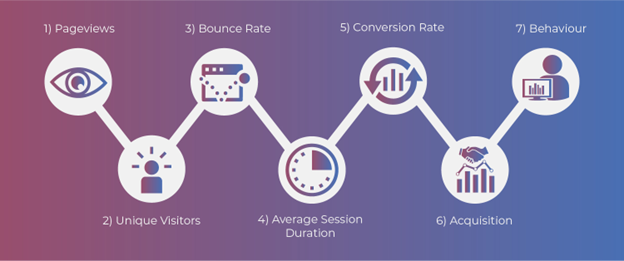SHARE

Effective search engine marketing is crucial for businesses aiming to succeed online in today’s digital landscape. One powerful tool that can help you optimise your search engine marketing efforts is Google Analytics. By harnessing its capabilities, you can gain valuable insights into your website’s performance and leverage this data to improve your marketing strategies. In this article, we will explore the basics of Google Analytics and delve into its various features and benefits for search engine marketing.
Understanding the Basics of Google Analytics
Before diving into the intricacies of Google Analytics, let’s take a moment to understand its importance in search engine marketing. Google Analytics is a free web analytics service provided by Google that allows you to track and analyse various aspects of your website’s performance. By implementing a tracking code on your website, Google Analytics collects data on visitor behaviour, traffic sources, conversions, and more, enabling you to make data-driven decisions to improve your website’s visibility and effectiveness.
Google Analytics is a powerful tool that provides valuable insights into your website’s performance. It helps you understand how users interact with your site, what pages they visit, and how long they stay on each page. This information is crucial in optimising your website to attract and retain visitors.
The Importance of Google Analytics in Search Engine Marketing
When it comes to search engine marketing, knowledge is power. With Google Analytics, you gain invaluable insights into the effectiveness of your marketing efforts. You can track the number of visitors to your website, where they came from, and what actions they take on your site. Armed with this information, you can optimise your marketing campaigns, identify areas for improvement, and target your audience more effectively.
For example, suppose you run an online store selling handmade jewellery. Using Google Analytics, you can track which marketing channels drive the most traffic to your website. Suppose you find that social media platforms like Instagram and Facebook are generating significant visitors. In that case, you can allocate more resources to those channels and tailor your content to appeal to that audience.
Furthermore, Google Analytics allows you to measure the success of your website in terms of conversions. A conversion can be any desired action a user takes on your site, such as purchasing, signing up for a newsletter, or filling out a contact form. By tracking conversions, you can identify which pages or marketing campaigns are most effective in driving user engagement and, ultimately, conversions.
Key Terms and Metrics in Google Analytics
Before we proceed, let’s familiarise ourselves with some key terms and metrics that you’ll encounter in Google Analytics. Metrics such as sessions, bounce rate, average session duration, and conversion rate provide valuable information about how users interact with your website.
A session refers to a period of time that a user is actively engaged with your website. It starts when a user lands on your site and ends when they leave or remain inactive for a specified period. By analysing the number of sessions, you can gauge the overall traffic to your website.
The bounce rate measures the percentage of visitors who leave your site after viewing only one page. A high bounce rate may indicate that your website’s content or user experience needs improvement. On the other hand, a low bounce rate suggests that visitors are exploring multiple pages, indicating a higher level of engagement. The average session duration provides insights into how long users spend on your website. This metric can help you determine if users are finding your content engaging and if they are spending enough time to take the desired actions.
Conversion rate is a crucial metric that measures the percentage of visitors who complete a desired action, such as making a purchase or filling out a form. It helps you evaluate the effectiveness of your website in achieving its goals and can be used to identify areas for improvement. Now that we have established the basics, let’s move on to setting up Google Analytics for your website.
Setting up Google Analytics for your website is a straightforward process. First, you need to create a Google Analytics account by signing up on the Google Analytics website. Once you have an account, you can generate a tracking code that needs to be added to every page of your website. This code allows Google Analytics to collect data and provide you with insights. After adding the tracking code, it may take some time for Google Analytics to start gathering data. Once the data starts flowing in, you can access a wide range of reports and metrics through the Google Analytics dashboard. These reports provide detailed information about your website’s performance, including the number of visitors, their demographics, the devices they use, and much more.
Google Analytics also offers advanced features such as goal tracking, which allows you to set specific objectives for your website and track their completion. This can be particularly useful if you have specific actions you want users to take, such as signing up for a newsletter or downloading a resource. Google Analytics is an essential tool for any website owner or digital marketer. It provides valuable insights into your website’s performance, helps you understand user behaviour, and enables data-driven decision-making. By utilising Google Analytics effectively, you can optimise your website, improve your marketing campaigns, and ultimately achieve your goals.
[thrive_leads id=’8310′]
Setting Up Google Analytics for Your Website
Integrating Google Analytics with your website is a straightforward process that requires a few simple steps.
Steps to integrate Google Analytics
First, visit the Google Analytics website to sign up for an account. Once you have created an account, you will be prompted to set up a property. Properties in Google Analytics represent your website or app. Follow the prompts to set up the necessary tracking code, which you must add to your website’s HTML code.
Configuring Your Google Analytics Account
After you have successfully set up your Google Analytics account, take some time to configure your account settings. This includes setting up goals, filters, and custom segments based on your specific marketing objectives. By customising your account, you can tailor Google Analytics to meet your unique needs and track the metrics that matter most to your business.
Utilising Google Analytics for search engine marketing
Now that you have set up Google Analytics for your website let’s explore how you can leverage its features to enhance your search engine marketing efforts.
Tracking your website’s traffic with Google Analytics
One of the primary benefits of using Google Analytics for search engine marketing is its ability to provide detailed insights into your website’s traffic sources. You can track how visitors find your site through organic search, paid advertising, referrals, or social media. This information allows you to identify the most effective channels for driving traffic to your website and allocate your marketing resources accordingly.
Analysing Keyword Performance with Google Analytics
Keywords are the building blocks of search engine marketing, and with Google Analytics, you can analyse their performance to optimise your marketing efforts. By monitoring keyword rankings, click-through rates, and conversion rates, you can identify high-performing keywords and optimise your content and ad campaigns to better target your audience and increase your website’s visibility in search engine results.
Interpreting Google Analytics Reports for Marketing Insights
Once you have gathered data from Google Analytics, the next step is to interpret the reports and derive actionable insights to enhance your search engine marketing strategies.
Understanding Audience Behaviour through Google Analytics
Google Analytics provides valuable information about how users engage with your website. By analysing metrics such as pages per session, average session duration, and bounce rate, you can gain insights into audience behaviour, identify popular pages, and determine areas for improvement. This knowledge enables you to refine your website’s content and user experience, leading to higher engagement and increased conversions.
Using Google Analytics to Improve your Search Engine Marketing Strategy
Another key aspect of search engine marketing is optimising your campaigns to maximise conversions. Google Analytics offers conversion tracking, which allows you to measure the effectiveness of your campaigns in driving desired actions, such as purchases, form submissions, or newsletter sign-ups. By analysing conversion data, you can identify underperforming campaigns or landing pages and make data-driven optimisations to improve their impact.
Advanced Features of Google Analytics for Search Engine Marketing
While the aforementioned features cover the basics of leveraging Google Analytics for search engine marketing, this powerful tool offers even more advanced capabilities to further enhance your marketing efforts.
Customising your Google Analytics Dashboard
Google Analytics allows you to customise your dashboard by selecting the metrics and dimensions that are most relevant to your business goals. With a customised dashboard, you can access the information that matters most at a glance, saving time and enabling you to make more informed decisions about your search engine marketing strategies.
Leveraging Google Analytics Advanced Segments for Marketing
Advanced segments are a powerful feature of Google Analytics that allows you to segment your data based on specific criteria. By creating segments to isolate specific user groups or marketing campaigns, you can gain deeper insights into their behaviour and fine-tune your marketing strategies accordingly. Whether you want to analyse the performance of a specific region, track the behaviour of new vs. returning visitors, or evaluate the effectiveness of a particular marketing campaign, advanced segments can provide the granular data you need.
In conclusion, harnessing the power of Google Analytics is essential for any business aiming to optimise its search engine marketing efforts. By understanding the basics, setting up your account, utilising its features, interpreting reports, and exploring its advanced capabilities, you can gain actionable insights and make data-driven decisions to improve your website’s visibility, drive targeted traffic, and achieve your marketing goals. So, don’t miss out on the invaluable advantages Google Analytics has to offer – start leveraging its power today!
[thrive_leads id=’3523′]
Frequently Asked Questions About Google Analytics for Search Engine Marketing
What is Google Analytics in SEM?
Google Analytics is an essential tool for website owners, providing valuable insights into how users interact with their digital assets and marketing campaigns. This information can improve the user experience, increase website traffic, and drive more sales and revenue.
Why is Google Analytics Important for Marketing?
Google Analytics is a very important tool for website owners, as it provides valuable insights into how users are interacting with their digital assets and marketing campaigns. This information can be used to improve the user experience, increase website traffic, and ultimately drive more sales and revenue.
What is the Best Use of Google Analytics?
Google Analytics helps you see how your site’s users, visitors, and customers interact. It shows you behavioural data that you can use to improve your marketing campaigns, optimise your site, and ultimately improve your results. User metrics include things like Bounce rates.
What are 3 Examples of Data Google Analytics can collect?
- Number of users.
- Approximate geolocation.
- Browser and device information.
How safe is Google Analytics?
It does not track people or profile people across the internet. Google Analytics cannot track people across the web or apps. It does not create user profiles. Google Analytics helps owners of apps and websites understand how their users engage with their sites and apps (and only their site or app).
















